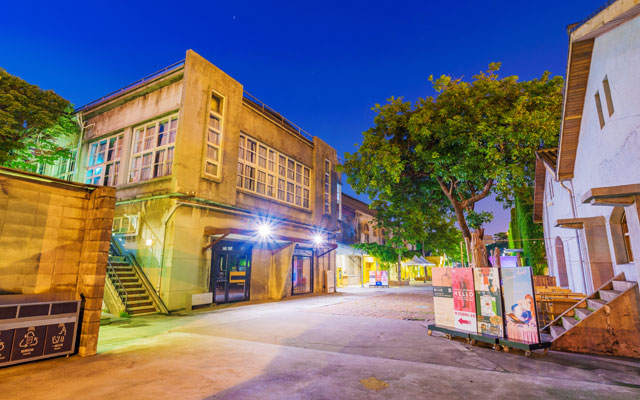Revamped hotels, heritage venues and an advanced rail link in the capital are welcoming association meetings, promising a better experience

Government agencies supporting Taiwan’s development as a destination for business and trade association events are taking critical steps to educate suppliers and organisers on how to better bid for international conferences, and to offer a more impressive suite of support for incoming meeting groups.
Nana Di, project manager, convention section II, Taiwan World Trade Centre Exhibition and Convention Operation Department of the Taiwan External Trade Development Council (TAITRA), said MEET Taiwan (the Bureau of Foreign Trade’s business events promotion agency) has increased its number of networking roadshows in South-east Asia to twice a year, and is holding educational workshops with ICCA for Taiwan’s event suppliers.

As well, under Taiwan’s tourism bureau, the BEST (Business Events in Surprising Taiwan) Rewards Programme has been introduced to entice organisers and conference groups with inspection subsidies, visa application counselling, MEET Taiwan discount cards and more.
These efforts complement ongoing infrastructure developments across Taiwan, further enticing meeting planners to take their gatherings to the vibrant, evolving destination.
Major business hotels in capital Taipei have upgraded along with the times. Grand Hyatt Taipei, for instance, completed its refurbishment in 2015. All 853 guestrooms and suites were rebuilt, and two new new restaurants were added, among other refreshing surprises.
As well, Sheraton Grand Taipei Hotel has transformed its two basement levels into a dedicated event space, comprising a Grand Ballroom for about 1,000 pax, a Chinese restaurant and eight breakout rooms.
Commute in the capital has also improved with the latest high-speed rail link from Taipei Taoyuan International Airport to Taipei Nangang Exhibition Centre (TNEC).
According to Amber Chen, assistant vice president of GIS Group, the new high-speed rail link has helped to attract tradeshows and business events to the city. She said that with the link, the capital city’s venues are now regarded as the most accessible in Taiwan, with other emerging cities such as Kaohsiung proceeding at a slower pace with fewer facilities.
Taipei is currently home to four exhibition halls: One in New Taipei City Exhibition Hall, two in Taipei World Trade Centre (TWTC) and another in TNEC. The last is the largest, with a total area of 45,360m2 that can take up to 2,467 standard-sized booths.
The city also has four main convention centres, including Taipei International Convention Centre (TICC) which houses 26 breakout rooms and the country’s largest theatre, The Plenary Hall, with 3,100 seats.
Coming up, TNEC will have its second hall built by 2018, with Taichung’s Central Taiwan Convention Centre and Tainan Convention and Exhibition Centre completing from 2018-2022.
Meanwhile, as demand for out-of-the-box venues rises, the Taiwanese government is stepping up its efforts to open up more conserved heritage sites and buildings to cater to the associations crowd.
Sheraton Grand Taipei Hotel’s director of sales and marketing, Betty Tsai, said: “Top management often want something different from a traditional function room; this is especially so for association meetings.”
Unique locations enjoying high demand include presidential suites, Taipei’s Huashan and Songshan cultural and creative parks, as well as historical department stores, Tsai shared.
Thanks to government cooperation with bus companies, access to such venues and attractions outside the city has been improved, explained Tsai, who hopes that more of such efforts will pull in more meeting planners.
In response to this movement, MEET Taiwan has been increasing dialogues with heritage venues, hoteliers and conference organisers.
Di revealed that MEET Taiwan is working on making more of such historical venues available, especially for receptions and gala dinners.
Successful examples of heritage buildings in Taiwan that have opened up to business events include Taipei’s The Red House; Taipei Story House and Huashan 1914 Creative Park, with the last one providing up to 2,000 seats and eight function rooms; Hualien Cultural Creative Industries Park and The British Consulate at Takow in Kaohsiung.
GIS Group’s Chen opined: “Taipei needs more unique spaces, such as museums or historical buildings, for offsite gala dinners… Areas like Songshan Park are not big enough, and clients want something more exciting compared to exhibition centres.”
On the ground, organisers are pulling their weight in attracting association events to Taipei.
K&A president Kitty Wong said her company is working with MEET Taiwan to encourage more local associations to bid for meetings, and is also approaching association headquarters instead of relying on communicating through their local offices.
GIS Group is pulling in large medical conferences that can draw more than 1,500 attendees, noted Chen, with more bookings coming up in 2018 as compared to this year.
Still, meeting specialists say more must be done for Taiwan to score higher on the association meetings chart. Chen observed that more associations are expecting to use higher technology during their conferences, and “meeting apps are almost a must” – but venues’ Wi-Fi infrastructure is often “not sufficient” to support these services.
“We’ve had to step in to provide and set up stronger Wi-Fi for the exhibitors,” said Chen.
Wong added that older centres like TWTC and TICC are in need of refurbishment, and expressed enthusiasm that the mayor of Taipei is looking at building a new convention centre.










